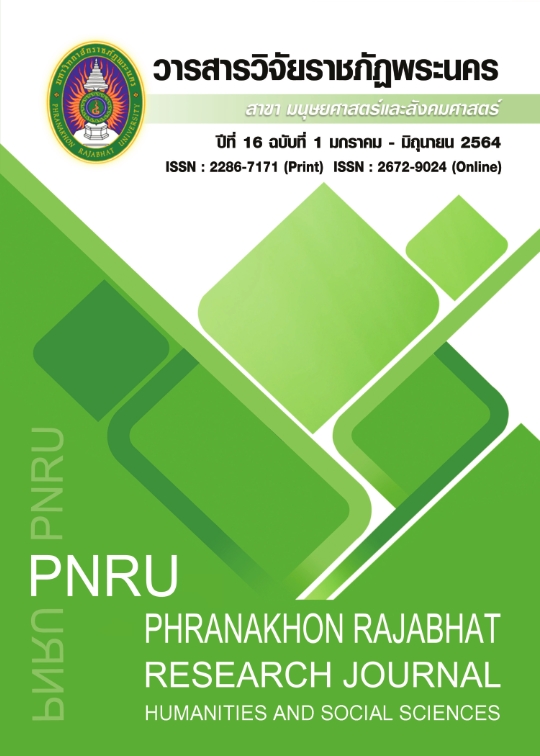A MULTI-GENERATION MANAGEMENT MODEL FOR SCHOOL PERSONNEL UNDER THE OFFICE OF UDONTHANI PRIMARY EDUCATIONAL SERVICE AREA 2
Main Article Content
Abstract
The purposes of this research were 1) to study the components and the indicators of multi-generation management of school personnel, 2) To check the consistency of the indicator model of multi-generation management of school personnel with the empirical data, and 3) to propose a multi-generation management model for school personnel under the Office of Udonthani Primary Educational Service Area 2. The sample was 285 school personnel which was get by the multi-stage sampling. The research tool was a rating scale questionnaire. The basic statistic and the confirmatory factor analysis were analyzed by M-plus7 program. Suitability, possibility, and usefulness were evaluated by the specialists.
The results showed that: 1) multi-generation management of school personnel comprised 5 components: Building Team Diversity, Coaching and Mentoring, Constantly Personnel Development, Quality Personnel Retention and Communication for Relationship, 2) the multi-generation management indicator model was consistent with the empirical data which valued = 75.370, df = 59, /df = 0.277, P-Value = 0.0740, RMSEA = 0.031, SRMR = 0.015, CFI = 0.996, TLI = 0.994, and 3) the multi-generation management model for school personnel consisted of a model’s name, a concept and basic principle, an objective, achievement’s goals, and keys to success. And the results of utility, propriety, and feasibility assessment were the highest.
Article Details
Each publish articles were copyright by Phranakorn Rajabhat University
Any contents which appeared in each articles in the journal were authors personal opinion. It did not relate to Phranakorn Rajabhat University and other instructors in the university. Each authors would take responsibility on their articles. If there are any mistake, the authors will take responsibility themselves
References
Chawanowanich, J. (2020). 'Ageism' The age bias of two generations becomes a problem of thought conflict. Retrieved from https://www.gqthailand.com/views/article/what-is-ageism [2020, 5 December]
Chueabangkaew, P. (2014). Diversity Management: Human Resource Management Strategy in the Creative Economy. Executive Journal. 31(1), 153-159.
Damrongpanit, S. (2020). Mplus program with Analysis of Research Data in Behavioral Science and Social Science. (2nd ed.). Bangkok: Chulalongkorn University Press.
Dechawatanapaisal, D. (2009). Perception of Generation Y features and motivation for work: perspectives between different generations in the organization. Chulalongkorn Business Review. 31(121), 1.
Hair, J.F., Black, W.C., Babin, B.J., & Anderson, R.E. (2010). Multivariate Data Analysis. (7th ed.). Prentice Hall, Upper Saddle River, New Jersey.
HrNote. (2019). Why Workforce Diversity in Organization is Important? (Workforce Diversity). Retrieved from https://th.hrnote.asia/personnel-management/190820-workforce-diversity/ [2020, 5 December]
Keeves, P.J. (1988). Educational Research, Methodology and Measurement: An International Handbook. Oxford. Pergamon Press.
Konkanchana, S. (2004). A Development of Quality Indicators for Public (Education Doctoral Dissertation). Bankkok: Srinakarinwirot University.
Harvey, B. & Bowin R. B. (2000). Human Resource Management: An Experiential Approach. New Jersey: Prentice-Hall.
Logutarawong, K. (2012). Generation Gap Management to Develop Human Resources in Organization. Panyapiwat Journal. 3(2), 132-143.
Malawai, J. (2020). A Model for The Innovator Team Enhancement in Small- sized School Under the Office of Mukdahan Primary Educational Service Area. (Master’s degree Dissertation), Graduate School, Khon Kaen University.
Suphanalai, P., Kongklay, J. and Jadesadalug, V. (2018). The Antecedence and Consequence of Talented Management Influenced to High Performance Organization in Thailand. VRU Research and Development Journal Humanities and Social Science. 13(3), 21-30.
Thawinkarn, D. (2017). Science and Art in Educational Administration: Education Textbook Scholarship (No.3). Khon Kean: Faculty of Education, Khon Kean University.
Theppawan, P. (2012). A-Z Modern Human Resource Management Tools. Bangkok: SE-ED Education.
Upper Secondary Education Bureau. (2017). Driving Thai Secondary School 4.0 for the 21st Century. The Office of the Basic Education Commission. Bangkok: Ministry of Education.
Wiriyapipat, N. (2016). The Role of HRM: Generation Gap Management in Organization. RMUTP Research Journal Humanities and Social Science. 1(2), 73-88.


